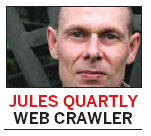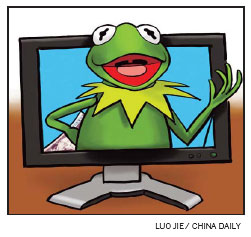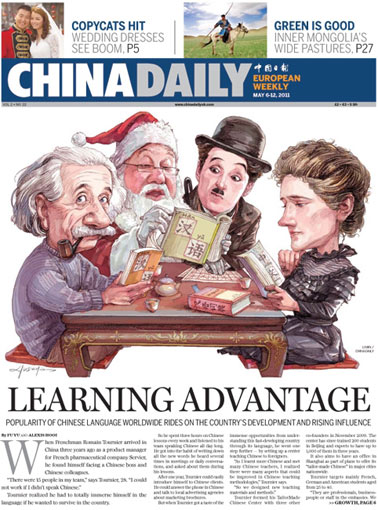View
Web freedom lies in eyes of the beholder
Updated: 2011-03-23 07:40
(China Daily)
 |
The honeymoon period is over and it's time to remove our rose-tinted spectacles when surfing the Net to see it in the true light of day. Whoever thinks the Web, by its very nature, is a source of unalloyed goodness, even freedom, should seriously think again. It's no better or worse than the people who people it.
Recent revelations about how government agencies in the United States are controlling opinion using "sock puppets" and "astroturfing" are reminders of what a seriously misleading place the Web can be.
As the term suggests, sock puppets are not real people, but online personas or avatars that are controlled by individuals who work for Centcom, which oversees military operations in the Middle East and Central Asia.
Sock puppets pop up in online forums and on social networking websites, pretending to be ordinary netizens, in order to promote the US and undermine its "enemies" and thereby win favor in the court of world opinion.
Astroturfing is a similar kind of operation, sometimes associated with companies that promote their products, or attack those of the competition.
We have the same in China, of course, only it's not called Centcom, they're known as "50 centers" because they're said to be paid about 5 mao (8 US cents) for every comment they make to mislead the general public.
 |
Private individuals also cheat by posting comments on their own posts (pretending to be ordinary readers), make fake referrals and engage in "optimization" to artificially inflate website ranking.
There are lies and damned lies everywhere you look on the Web. It doesn't matter where you are; the principle is the same. What you see is not what you get.
Some time ago I had a disagreement with a friend of mine about the Internet. He was an idealist and by comparison made me seem like a realist. It was around the time when Napster and sites like it were causing the recording industry no end of problems because they were offering free content such as music and films.
His argument was the Web, by its very nature, would stay one step ahead of the government and big business because hackers would always find a way around it. My feeling was big business and governments would, respectively, always find a way of making us pay and assert their control.
While my friend had a point, I still believe that as a technology matures it leaves the domain of those who created it and falls into the hands of those who pay for it.
To me, this doesn't look so different from some journalism and most PR in the real world, but that is a fact we seem to accept without difficulty. The Internet, however, is at an earlier stage of development and youthful idealism still rules occasionally.
For instance, when Google pulled out of the mainland, sort of, the estimable Hillary Clinton made a grandiloquent speech about the necessity of Internet freedom. Her government was then faced with a barrage of embarrassing WikiLeaks, which concentrated her mind and as a result the ever-pragmatic Secretary of State gave a second, more measured presentation, about how freedom comes with responsibility and limitations when it comes to security.
WikiLeaks founder Julian Assange, who knows a thing or two about the issue, says he now believes the Internet is the biggest obstacle to free speech that we face and is the "greatest spying machine the world has ever seen".
Assange was one of those hackers my friend was talking about all those years ago who, he thought, would stay one step ahead of government and big business and provide content for free and publish without fear or favor, making the Internet a kind of heavenly space. That he has changed his tune is not surprising. Realistically, the medium of communication has changed, but people haven't.
E-paper

War of the roses
European Chinese rose growers are beating their Chinese rivals at their own game
High-tech park gets big boost
At the source
Merchant of Venice
Specials

Sino-US Dialogue
China and the US hold the third round of the Strategic and Economic Dialogue on May 9-10 in Washington.

Drunk driving
Drunk drivers face a detention for one to six months and a revokation of their drivers' license.

V-Day parade
A military parade marking the 66th anniversary of the Soviet victory over Nazi.
